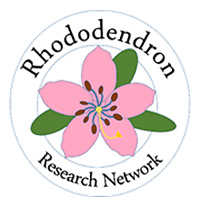
Rhododendron Research Network
Overview of Research Network Objectives
Juliana S. Medeiros
Rhododendron Research Network Program Coordinator
Executive summary
The Rhododendron Research Network is a collaboration between the American Rhododendron Society (ARS) and an
international group of Rhododendron researchers. Our network focuses on three main objectives:
1. Promote Rhododendron as a study system in plant physiology, pathology, ecology,
evolutionary biology, plant breeding, genetics, horticultural sciences, conservation biology, ethnobotany, and medicinal chemistry.
2. Promote the ARS and associated botanical gardens as a resource for Rhododendron research and
public engagement, and foster participation and membership of scientists in the American Rhododendron Society.
3. Create opportunities for communication and collaboration within the international community of
Rhododendron researchers, and between scientists and ARS members.
Why promote Rhododendron as a study system?
As one of the most speciose and diverse genera of plants, Rhododendron has already proven to be a rich study system for
addressing a wide range of biological questions. The 1000+ species in the genus offer opportunities to investigate a
range of ecological roles. Some rhododendron species form the predominant component of native floras, others are members
of dwindling endangered populations, and some are even aggressively invasive alien species. These characteristics are
associated with diversity in climate, plant habit, morphology and stress tolerance, with the result that Rhododendron
has proven to be a fascinating choice for studies in evolutionary biology and plant physiology. This type of work is
expected to be even more fruitful in coming years, when recent efforts to fully sequence the genome of Rhododendron
are finalized. As there are relatively few woody plant genomes available for study, Rhododendron is now poised to
become a preeminent study system in genetics as well. In addition, species within the genus can boast great value
to human society, including a wide variety of local ethnobotanical uses, some of which are being explored for their
potential in medicinal chemistry. As a result, the popularity of the genus Rhododendron as a study system has the
potential to grow over time. A perceived problem is that the existing international nature of the Rhododendron
research community, combined with the overwhelming amount of scientific information bombarding researchers today,
has resulted in many small pockets of researchers working in relative isolation, with haphazard opportunities to
engage others working with Rhododendron. Thus, a concerted international effort is needed now to realize the full
research potential with this genus.
Why partner with ARS in this project?
There is a great deal that the ARS has to offer to the Rhododendron research community. ARS members contribute
substantially to scientific research on Rhododendron, and the society's archives harbor a wealth of knowledge, with
great value for research. Many members have made a lifetime of Rhododendron observations, ranging from maintaining
detailed hybrid pedigrees, conducting genetics studies, documenting climate performance evaluations, and undertaking
conservation-minded field collecting expeditions. The ARS archives include a long-standing publication, the
Journal of American Rhododendron Society (JARS), and a large database on horticultural, ecological and morphological
attributes of species and hybrids. This resource collection is rare in the scientific world, where immense efforts
are currently being made to compile the scant information available for most plant genera. In addition, the ARS has
a history of supporting research through grants, and provides opportunities for public engagement in research through
JARS articles and annual conferences. Members of ARS have also been active in organizing annual scientific conferences
on Rhododendron and compiling extensive bibliographies of the scientific literature. Lastly, the strong relationships
between the ARS and botanical gardens, along with the ARS seed exchange, provide access to invaluable propagule
resources that are unmatched in the scientific community. These rich assets are familiar to some researchers, but
society engagement by scientists could be enhanced by directed efforts to foster communication and collaboration
between ARS members and the international Rhododendron research community.
Also, more than ever, researchers are being expected to reach out and engage the public in scientific conversations, as a way to improve scientific accountability to society and as an informal method of science education. By partnering with the ARS, we hope to build opportunities for researchers to communicate their findings to non-scientists, and to learn from ARS members who have invaluable expertise in Rhododendron. Furthermore, we expect ARS membership to benefit and increase through enhanced awareness of international research on Rhododendron, while in turn gaining opportunities to enrich research through community science efforts.
► Network Accomplishments, Current Initiatives, Future Activities